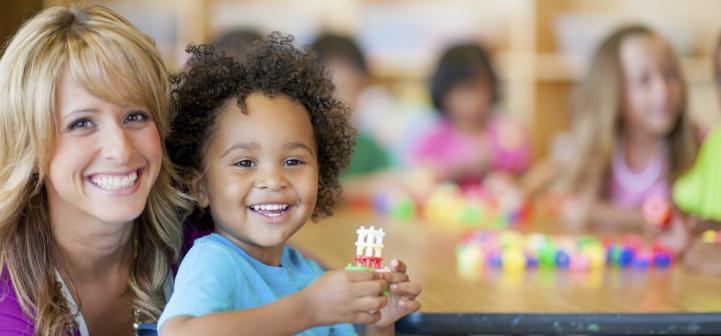
Learning to become independent is one of the most important milestones of the toddler years. Toddlers who say “no” to everything and insist on doing things for themselves are building a sense of identity that is important for healthy development. Child care providers can support toddlers’ social and emotional development by providing opportunities for children to do things independently, practice problem solving and begin learning how to get along with others. Here are some common social and emotional milestones during the toddler years.
Between 12 and 18 Months, Most Toddlers…
- may become upset when separated from parents or trusted caregivers
- may like to hand objects to others
- can play alone on the floor with toys
- may recognize themselves in a mirror or pictures
- may enjoy being held and read to
- may be able to imitate others, especially by coughing, sneezing or making animal sounds
- may enjoy an audience and applause
Between 18 and 24 Months, Most Toddlers…
- may like to imitate others children
- may begin to show signs of independence
- may say “no” frequently
- have difficulty sharing
- might be possessive of favorite toys
- find it difficult to wait and want immediate gratification
- may get angry and have temper tantrums
- may act shy around strangers
- can comfort a distressed friend or parent
- may refer to themselves by name
- may use the words “me” and “mine”
- can enjoy looking at picture books
- might try to do many things alone
- enjoy adult attention
- enjoy pretending –wearing hats, talking on phone
- may enjoy exploring, getting into everything, and require constant supervision
- generally do not remember rules
- may get physically aggressive when frustrated (slapping, hitting, biting, etc.)
- will show affection by returning a hug or kiss
- might become attached to a toy or blanket
Between 24 and 36 Months, Most Toddlers…
- play alongside others more than by themselves, but don’t share toys or work together
- may act shy around strangers
- may like to imitate parents
- can get easily frustrated
- may show affection by giving hugs and kisses
- insist on trying to do many tasks without help
- may enjoy more complex make-believe, such as making dinner
- may offer toys to other children, but then want them back immediately
For More Information
To learn more about how child care providers can support toddlers’ development, take a look at the following eXtension Alliance for Better Child Care articles:
- Toddlers in Child Care
- Basic Tips Child Care Providers Can Use to Guide Children’s Behavior
- Dealing with Toddler Temper Tantrums in Child Care
- How Can Child Care Providers Prevent Biting?
- What Child Care Providers Can Expect in Toddlers’ Social and Emotional Development
- What Child Care Providers Can Expect in Toddlers’ Physical Development
- When Should Toddlers Stop Taking Pacifiers, Blankets, and Other Security Objects to Child Care?
Photo by icanchangethisright / CC BY http://creativecommons.org/licenses/by/2.0/
